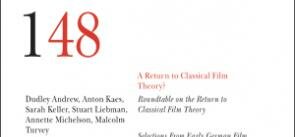Christian Metz is remembered today as having almost single-handedly transformed the culture of film studies. This widely held view was summarized by one commentator, who wrote that “with Metz a new research paradigm is born, as well as a new generation of scholars.
Articles des membres
Examining Walter Ruttmann’s early animated advertisements in relation both to his Opus films and to contemporary advertising psychology, this article argues that advertising, far from representing a marginal phenomenon or a compromise of artistic integrity, was central to Ruttmann’s professional identity as an avant-garde filmmaker.
In 1963 and 1965 Jean Mitry published two massive tomes that, according to Christian Metz who reviewed them, bookended the period sometimes known as ‘classical film theory.’ Just slightly under 1000 pages long, printed in a large format, the two books are colossal in both size and scope.There is a common underlying thread that joins together aspects of Esthét
In the light of recent debates in film studies over the nature of film theory and the kinds of knowledge it produces, this paper examines some of the epistemological issues currently being raised by film scholars.
À la fin des années 40 Gilbert Cohen-Séat fonde, gâce à une entente avec l’Université de Paris, l’Institut de filmologie. Celui-ci offrira la première diplômation en études cinématographiques en France. En 1962 l’Institut ferme définitivement ses portes.
Pourquoi les travaux véritablement interdisciplinaires, qui font appel à plusieurs paradigmes pour construire le savoir adéquat à la situation, se comptent-ils sur les doigts de la main dans le champ des études cinématographiques, au moins en France, alors que le cinéma est pourtant par excellence, du fait de son caractère de "fait social total", un objet qui

